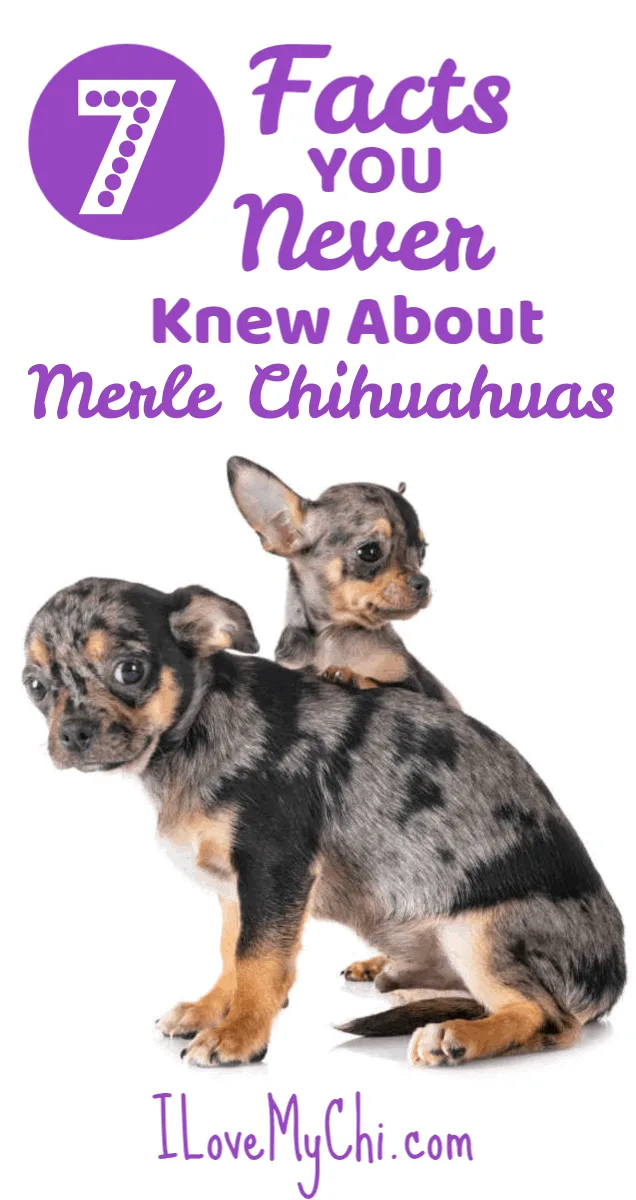
As an Amazon Associate, I earn from qualifying purchases.
One of the most unique aspects of Chihuahuas as a dog breed is the wild variation between different pups. Some Chihuahuas are short-haired, some are long-haired, some may have different head shapes, and some may even be blue!
Many potential chi-owners seek rare color and marking combinations when looking for a new Chihuahua, and Merle Chihuahuas are among the most distinct and sought-after coat patterns.
Check out our main post that showcases all our Chihuahua fact articles!
Merle, known sometimes as “ dapple ” in other breeds, refers to a spotted or mottled coat pattern. The pattern extends to the dog’s base coat and skin. However, there is far more to Merle Chihuahuas than meets the eye.
In this article, we will break down everything that you never knew about Merle Chihuahuas, from the trait’s spotty history to the current controversy surrounding the pattern. Let’s count down seven facts that you never knew about Merle Chihuahuas.
1. MERLE IS A GENE MODIFIER

When it comes to the Chihuahua breed, Merle is not just a beautiful and unique coat pattern. Merle is actually a gene modifier. In layman’s terms, a gene modifier is a gene that affects how other genes express themselves.
This means that the Merle gene affects more than just coat color. Often, the Merle gene affects the dog’s skin pigment, resulting in light and dark spots beneath the coat. Likewise, the gene can even affect eye color.
2. MERLE CHIHUAHUAS CAN HAVE BLUE EYES… AMONG OTHER TRAITS

Yes, you read that correctly. Some Merle Chihuahuas have blue eyes, and some have one blue eye only.
This phenomenon is called heterochromia. A Chihuahua with one or more blue eyes will have an increased sensitivity to sunlight.
Unfortunately, the Merle gene modifier also causes some undesired health issues.
Merle Chihuahuas are more likely to develop hearing and vision problems. These issues will be present when the pup is born and will not improve as he or she ages.
The light pigmentation of a Merle Chihuahua’s skin makes them more susceptible to sunburns and ultraviolet radiation.
Because of this, it is easier for a Merle Chihuahua to contract skin cancer than a standard Chihuahua.
3. NO ONE IS SURE HOW OLD MERLE CHIHUAHUAS ARE
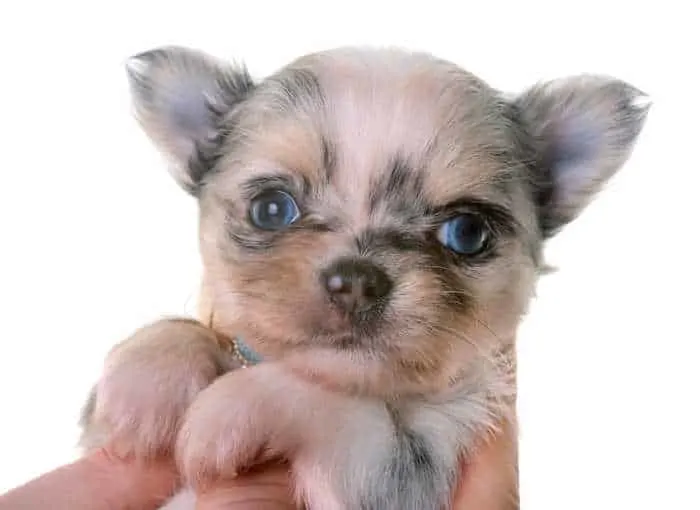
There is a debate in the Merle Chihuahua community over how long the gene has existed in Chihuahuas.
Some parties trace the gene back 70 years to the 1940s, but others conclude that the Merle color gene has only been present in Chihuahuas for the past 15 years.
The trouble with this debate is the lack of literature on Merle Chihuahuas. There are little to no scientific articles dating the emergence of the pattern.
However, the general consensus is that Merles have been present for the last 70 years.
4. MERLE IS PRESENT IN OTHER BREEDS
It appears that sometime in the 1940s, the Merle gene was bred into a line of Chihuahuas.
The Merle color gene appears in many breeds naturally, such as dachshunds, Australian Shepherds, and Great Danes.
Many believe that because there are no records of Merle Chihuahuas before the 1940s, the Merle gene was bred into the line by crossbreeding a Chihuahua with a breed known for the trait.
5. MERLE CHIHUAHUAS CANNOT BE REGISTERED WITH SOME GROUPS

Up until 2010, the Merle Chihuahua was considered purebred and was eligible for show.
However, in June 2010, the Canadian Kennel Club and the UK Kennel Club stopped recognizing Merle Chihuahuas as purebred. As a result, Merle Chihuahuas can no longer be registered with these groups.
The American Kennel Club still allows Merle Chihuahua dogs to be registered with them, depending on a few factors.
The Chihuahua Club of America issued this statement on Merle Chihuahuas.
They still allow the registering of Merles, but “due to the number of colors and patterns occurring in the Chihuahua breed, the ethical breeding of the Merle pattern can be much more difficult than in other breeds who limit the allowed colors and patterns.”
In other words, they will still register Merle Chihuahuas, but they think there are more ethical breeds that a potential Chihuahua owner could adopt instead.
6. MERLE CHIHUAHUAS SHOULD NEVER BE BRED TOGETHER
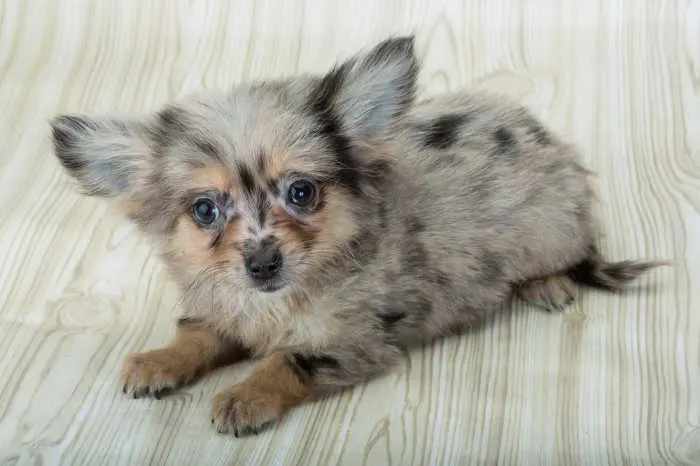
For the sake of ethical breeding practices, two Merle Chihuahuas should never be bred together to produce Merle puppies. Breeding two Merle Chihuahuas together result in a litter of “double Merles.” Double Merles will always suffer from eye and ear issues, and some will have shorter lifespans than a normal Chihuahua.
If you would like to breed your Merle Chihuahua, do so with a standard Chihuahua.
The Merle gene is dominant, meaning that roughly half of the puppies per litter will be Merle. The Merle gene shows up the best on black-and-tan, solid black, chocolate, and blue coats.
7. THERE IS SUCH A THING AS GHOST MERLES
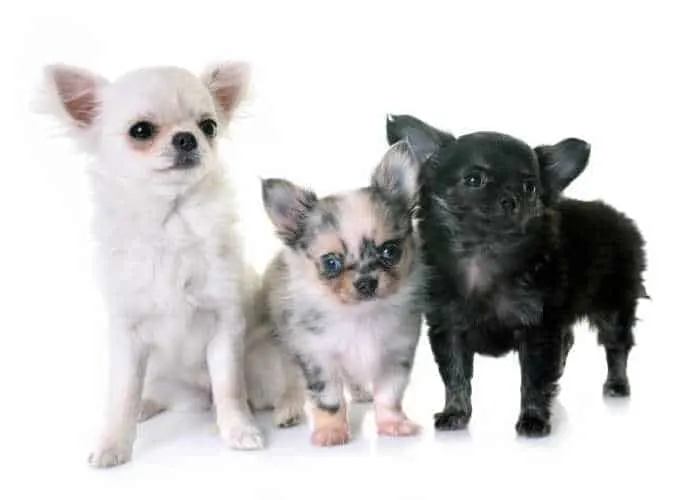
When a Merle Chihuahua is bred with a cream or sable-colored Chihuahua, their litter may contain ghost Merles. Ghost Merles, otherwise known as hidden or cryptic Merles, carry the Merle gene but don’t display the Merle coat pattern.
Pet owners cannot tell that their ghost Merle is a Merle Chihuahua at all. If the ghost Merle is bred with another Merle accidentally, the double Merle litter will be stuck with nasty health issues.
Therefore, if you suspect your Chihuahua may be a ghost Merle, you should have him or she genetically tested.
If you can register your ghost Merle Chihuahua, you should indicate that the Chihuahua is Merle, even if he or she has barely visible or no markings.
Doing so ensures that you are being an ethical Chihuahua owner and that you are taking responsibility for your Chihuahua’s unique trait.
Do Merle Chihuahuas Have Health Problems?
A Chihuahua with blue eyes will undoubtedly have an increased sensitivity to sunlight. The Merle gene modifier also results in other undesired health issues for this breed of Chihuahua as well. For example, these Chihuahuas are far more likely than other breeds and types to develop hearing and vision problems.
Do Merle Chihuahuas Require More Attention?
Chihuahuas, in general, are considered needy dogs, so the same applies to Merle Chihuahuas as well. They enjoy attention, being pet, and being played with. This has a lot to do with their hyperactive personalities.
What Is a Blue Chihuahua?
A blue Chihuahua is simply a Chihuahua that is just another color. Breeding a Blue Chihuahua is very difficult because the gene with the color is recessive. So, the dominant genes take over. So, it is very rare to have a Chihuahua puppy that has a full blue coat.
Why Is a Merle Chihuahua Controversial?
The Merle Chihuahua is so controversial not because of its beautiful color pattern but because of how the Chihuahua is bred to achieve that pattern. The Chihuahua does not have M (merle), and all Chihuahuas should have MM (non-merle). The president of the Australian Shepherd Health & Genetics Institute says, “the merle gene is not one that mutates spontaneously from the normal, non-merle version with any frequency.”
How is Merle Inherited in the Chihuahua Dog Breed?
Merle is simply a genetic pattern that is in a dog’s coat. The Merle gene is responsible for creating mottled patches of color in a solid coat along with blue eyes or odd-colored eyes. The gene can also affect the dog’s skin pigment as well.
What Does the Kennel Club Say About Merle Chihuahuas?
The Kennel Club definitely has a position when it comes to the Merle Chihuahua. Merle is sometimes considered an undesirable color within the Chihuahua dog breed. For this reason, the Kennel Club will no longer allow a dog owner to register a Merle Chihuahua if there is no documented evidence of the color being well-established over a sustained period of time. There are only certain breeds that they will accept Merle registrations for. As we stated above, the American Kennel Club does believe that there are Merle breeds that are more ethical.
TAKEAWAYS

The history and dialogue surrounding Merle Chihuahuas are just as compelling as their stunning coat patterns.
If your furry best friend happens to be Merle, consider yourself blessed! At the end of the day, all that matters is the adorable little Chihuahua curled up next to you.

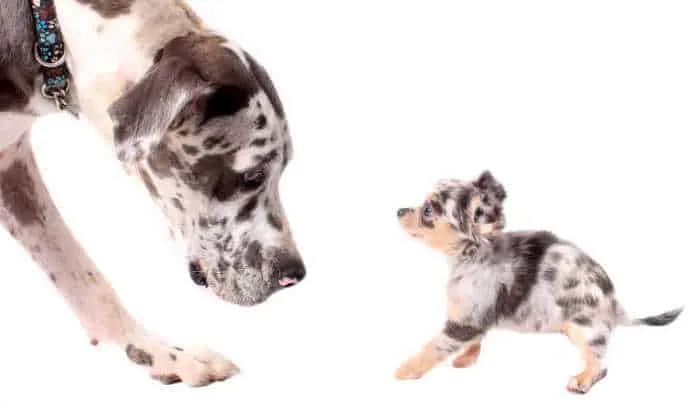
Bev Swan
Sunday 15th of June 2025
Hi, I have just had my second litter of Lavender merle puppy's. Neither mom or dad are their color pattern. They are a unique light grey lavender with black spots. I will post a pic, soon as their eyes open within 2 weeks... But, they are gorgeous and I can't see anyone saying they aren't chis! Mom and dad are certified registered chis and their offspring are not questionable chis! Period!
Kristy Duren
Sunday 19th of January 2025
I actually don't know how to post a pic or if u can
Kristy Duren
Sunday 19th of January 2025
Hi I'm Kristy and i have a 4 month old merle female names tiki. We live in Pueblo Colorado. I got her only one month ago and she is very skinny. At first i thought something was wrong but the vet said she was fine just skinny. Recommend giving her baby food. She will not eat dog food since i got her so i have to feed her real food. She play fine and is healthy otherwise. But after looking at pictures of other merle pups I'm wondering if she's normal and a lot of them are skinny long legs? Of anyone has an answer please let me know . I will post a pic of her alos
Cathy Bendzunas
Sunday 19th of January 2025
You can't post a photo on here. You can mail it to me at cathy@ilovemychi.com and just remind me about it so I won't forget your question.
Christina
Friday 16th of August 2024
Hi I've got a soon to be 2 year old male black tweed Merle his name is Ash
Cathy Bendzunas
Friday 16th of August 2024
I haven't heard of a tweed merle before. How is that different from a regular merle?
Julie
Monday 1st of April 2024
I have a two year old female chocolate Merle called Hope she is such a cutie but very stubborn sometimes. Loves attention from people and is feisty but very loving also. I would have more if I had the room
Cathy Bendzunas
Monday 1st of April 2024
The stubborn thing most Chihuahuas have. I'd love to have a merle. They are so pretty!